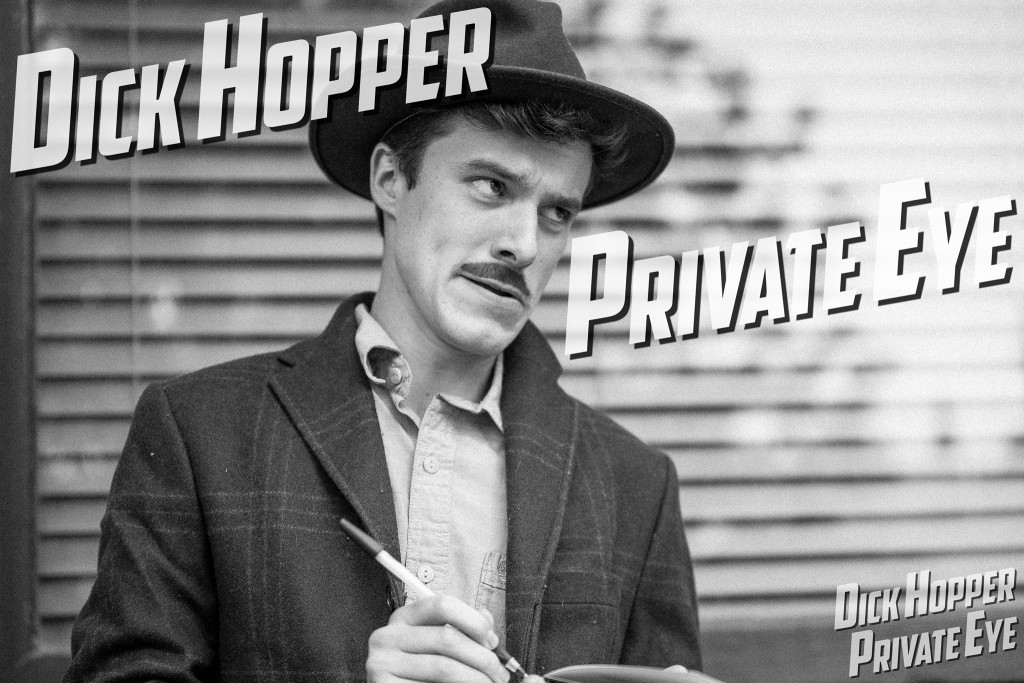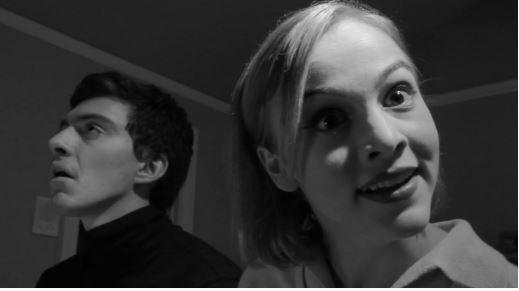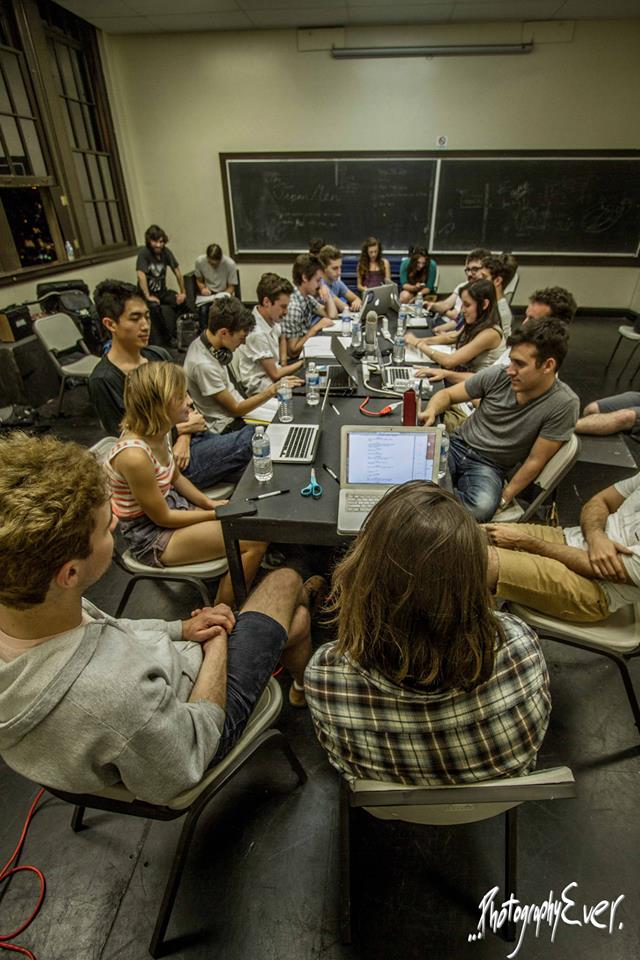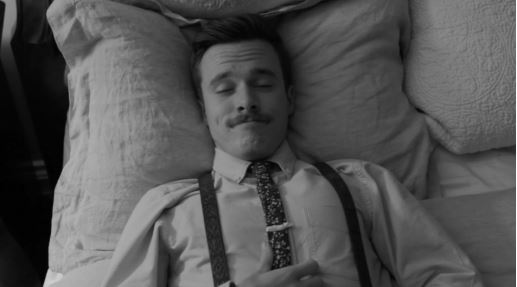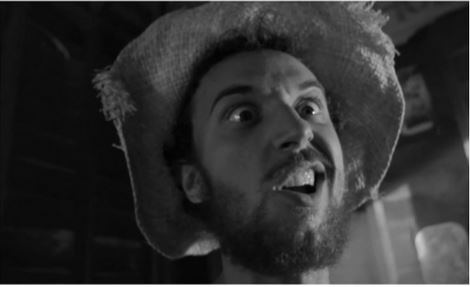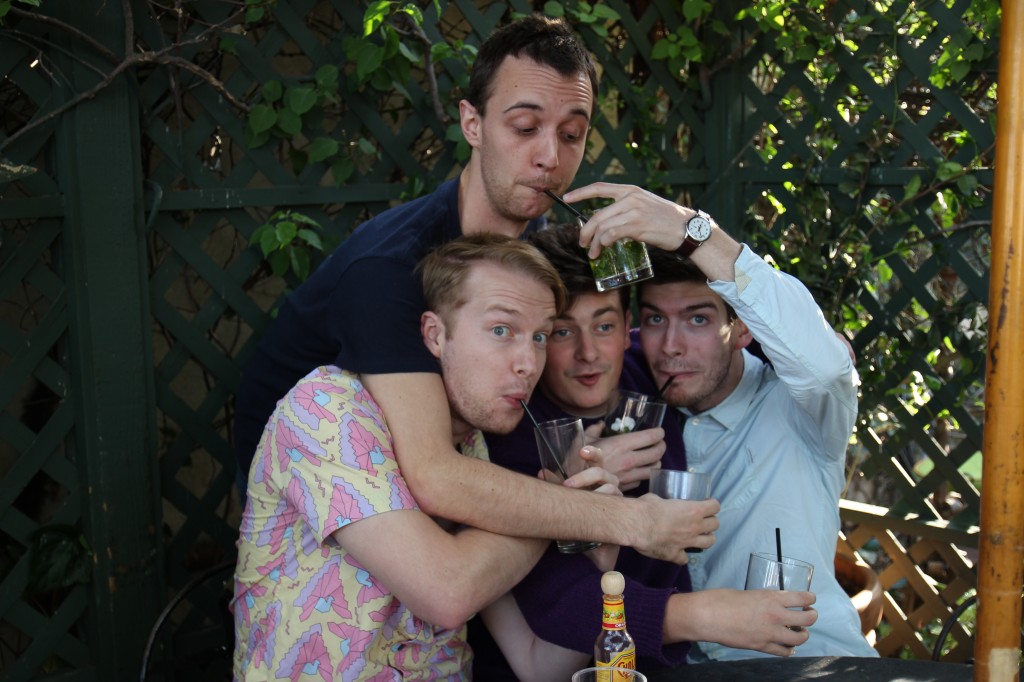I’m the first one at The Alcove, a bungalow-esque cafe in Los Feliz, smack in the heart of Los Angeles hipsterdom. That isn’t a knock on the place, it’s just that I’ve been living in the decidedly uncool ‘burbs of West LA for so long I forgot it was possible to walk down the street without pushing a baby stroller.
I’m waiting for a group of guys I knew in college (which, even though it was just a year ago, already feels eons removed from where I am now: working a day job, fundamentally unsure of what happens next.) They are fun dudes, and although I have a bit of a bone to pick with them, I’m mostly looking forward to talking to them about their newest project: A film noir web series farce titled, for better or for worse, Dick Hopper: Private Eye. It’s an elaborate twelve-part mystery starring Frank Gullihur as the eponymous detective whose sleuthing skills are outmatched only by his obtuseness.
When Paul Stanko, one of Dick’s producers and actors, first suggested setting this up, I had a moment of panic, because hell, what if it was crap, and I had to say so? God knows I’ve seen plenty of bad web series in my day—and been a part of a few more—but I’m not often asked to yea or nay them on a personal level. Before I watched the first four episodes yesterday, I promised myself that if they sucked I would just go no-show at today’s lunch. (I’m not great with confrontation.) Since this is an interview, not a review, I’m not obligated to donate my opinion, but can say now that I am thoroughly relieved to have fully enjoyed Dick Hopper, with my opinion landing on the “high” scale of things. You can take this article as an endorsement to watch the series. Here’s the trailer:
[The episodes are released weekly on YouTube. As of today, the first four are available to watch.]
The Dick Hopper boys roll in: director Alex Vazquez, co-writers and actors Tommy Fleming and Riley Smith, and the aforementioned producer Paul Stanko. We find a shady table outside the cafe and quickly decide that the best course of action is to get mildly inebriated. Our cocktail order is interrupted by a waiter demanding identification, and we have a good chuckle at that, all of us old enough to be solidly past the drinking age but obviously not adult enough to look it.
Haley: Welcome to the interview! We’re all here, we’ve all got booze. Should we start talking about Dick Hopper right away or do we take few minutes to commiserate on the burdens of adulthood?
Paul: I thought we were just hanging out.
Riley: Is this what an interview is supposed to be? ‘Cause it’s pretty nice. Just drinking and talking. When we’re all successful and doing interviews and not spending all of our time completely alone-
Paul: When Riley says “alone,” that’s our safety word. That’s the end of the interview. We can’t go down that sad tunnel.
Haley: I think an interview can be whatever you want it to be. In this case, it’s over mint juleps and loneliness.
Tommy: These are strong mint juleps.
Haley: We are here primarily to talk about Dick, of course, and from my end, this is very much an interviewer-interviewee dynamic. But we are also a group of young adults who have only just been birthed into the terrifying world of the Los Angeles Industry, and I think there’s a lot worth talking about there, too. And we’ll get to all of it. But for the sake of journalistic integrity, I suppose I must clarify to our audience that I do know you guys personally. There’s nothing objective about this, because I once tried out for your old college improv group, Commedus Interruptus…
Riley: Uh-oh.
Haley: …from which I was brutally rejected.
Paul: Oh god, it’s a bait and switch. Please don’t be mad!
Haley: Obviously there are no hard feelings, or I wouldn’t be here. But I’ve always wanted to tell you: the group was all guys at the time, and I’d never really been dumped before, and it was like being dumped by seven dudes at once.
Alex: I would like to say for the sake of this interview that I was not in the improv group, and so had no part in this whatsoever.
Tommy: And, for the record, we still respect you as a comedian and an artist.
Haley: Oh, it’s going on the record. Phew! Now that the air is cleared—Alex, you’re the only person at this table I don’t hold a grudge against. Tell me about how you got involved in Dick Hopper.
Alex: These guys pitched me the series at a party. We’d been friends for awhile. Paul and I went to high school together in Colorado, and I met Tommy and Riley at USC. And they were telling me about this series they were working on, and they were like, “We want you to direct it, because we wanted it all to be in-house, and also you’re the friend that knows how to do that stuff.” Because I was a film student. And I was like, “Oh that’s cool,” and didn’t think much of it, because these guys kick around ideas like that all the time. But they really stuck with it and kept developing it. They insisted I read the script. And I remember the first time they brought me the whole package, all twelve episodes written out.
Tommy: That’s not true. We had six episodes.
Alex: Well, it felt like twelve. It was very ambitious. A lot of material, a lot of pages, and when all the episodes were put together it was basically a feature film.
Paul: And a genre film, no less.
Alex: Like there’s one episode, and you haven’t seen it yet—Episode 9—that is just, when I read it for the first time, and they were telling me how they wanted to shoot it, I put my head in my hands and was like…”Ohhhh my god. How are we gonna do that.”
Haley: So how far ahead have you shot?
Everybody: Twelve episodes.
Haley: That’s impressive, because the hardest thing about launching a project like this is getting everyone to just show up in the same fucking room. People—artists especially, in this city—are difficult to wrangle.
Alex: I think people were drawn to the material. The material was great. And we passed around it around to people we knew—people we respected and trusted, people who were funny…
Tommy: Just random, homeless people.
Alex: The turning point for me was when I decided to move to Chicago with my girlfriend. And it gave us a hard deadline. We needed to have shot this by July, before I went. And we really sat and mapped out how we were gonna do it.
Tommy: For me I just said, “I’m not shooting Dick Hopper after the age of 25.”
Alex: Because this is very much a product of our age group, this place in our careers where we can be this goofy and this irreverent and we don’t have to make a serious artistic statement. We can just do something fun with our friends, and then show it to the world. So I came up with the basest, basest, most baseline budget—like, with duct tape and shoestrings—and that was where the Kickstarter came into play, and that was $10,000.
Tommy: And we are broke, so everyone knows.
Haley: And you just cast everyone you knew.
Riley: All the characters were written for the actors. There were no auditions.
Haley: I guess that explains where there are no grown-ups in the whole thing.
Paul: That’s not actually true. My mom–
Riley: and my Mom–
Alex: and my Mom —
Tommy: and Riley’s grandmother–
Paul: But they’re all extras.
Haley: But there are adult roles in the show—older fathers, the police chief—all played by actors under 25.
Alex: And I think that’s part of the charm. When I read the script I could just imagine these people I knew playing these parts. It was so much fun to shoot; we did it over 20 days. And we brought in some crew, some really great crew, who are worth way more than what we paid them.
Riley: You mean nothing?
Alex: They were really tremendous. You kind of get that one shot where you can call all your friends and pull in all the favors, and then you’re spent. And they all came in.
Paul: So there’s a sense of obligation there too, to finish it, and to get it out, because they deserve it. Everybody does look so good, and pulled out all the stops. We worked really hard and still are working hard, but all the actors and crew members and the Kickstarter people who donated to this, its like we owe them Dick Hopper.
Tommy: And by God, we’re gonna give them Dick.
Haley: So talk to me about the writing of this thing.
Riley: Tommy and I sort of wrote it in chapters. The process was Tommy would come over–
Tommy: Pour myself a few drinks.
Riley: He’d get a little drunk, I’d get a little high.
Tommy: We’re writers!
Riley: And we just wrote back and forth, back and forth.
Tommy: Riley and I are very comfortable with each other.
Riley: Very comfortable. Too comfortable.
Tommy: A lot was just improv, and seeing what we liked the most. And sometimes it would be way too gross, or weird, and that’s when we’d know it was going in the script.
Alex: And then I would read it and be like, guys, I don’t know about this one.
Riley: Alex and I disagree a bit on this, but I love the groan quality of the show. I get a pleasure out of the “oh man, this is so stupid” dialogue.
Alex: It is a great balance, because even those these are clever dudes, but there’s a definite sense of, “Well we’re just gonna go for the low stuff.” Because it works.
Tommy: We’re big fans of the dumb joke, and hammering them in, finding the most creative way you can to tell that bad joke again and again.
Alex: It’s part of the texture of the universe, at worst. At best, it’s a hilarious callback.
Tommy: I mean the show is called Dick Hopper: Private Eye.
Haley: So be honest with me: how much of the show was just built around Frank Gullihur [who plays protagonist Dick]? He has such a great voice, and can just inhabit that old-timey character.
Alex: One of the cutest things about Frank—and yes, I just called him cute—is that underneath his steely grumpy old man persona, he’s got this incredible sweetness and that enthusiasm underneath, and the more you work with him the more you see that. When we first started talking about his role, he went shopping, and he went out and bought his costume. He bought the shirt, the suspenders, that tie, and the little sperm whale tie clip, everything. He was so into it.
Tommy: Also, if you know Frank, you know the one thing he hates most is 2015. He’s such an old man.
Haley: And yet, Dick Hopper does not actually inhabit a specific time period. You’ll see anachronisms pop up every episode—headphones, cell phones. I assume that was all deliberate?
Riley: See, the world is film noir, not any one period.
Tommy: We just wanted the tropes, you know?
Paul: Because it’s a farce. Not a spoof or a parody of film noir, but a farce that takes place in a film noir world.
Tommy: It parodies itself as much as it skewers other things.
Alex: It doubles back on itself in really weird ways.
Tommy: Like a pig rolling around in its own shit.
Riley: And the deeper you get in, the more is dredged up. And in the finale, there’s a truffle! You’ve got to watch it to the end.
Haley: So there’s gonna be a big payoff at the end?
Alex: Yes. We’re a little bit different from most web series, which tend to have self-contained stories. We are very heavily serialized. You have to watch the episodes in order. It reads like a feature broken up into small parts, like a one-reeler you’d see a chapter at a time at the movies.
Paul: We don’t think of it as a web series. We think of it as a…web serial. Trademark it!
Riley: This makes it sound a lot more complicated than it is. It’s all very silly.
Paul: I know you’re the interviewer, but can I ask you a question, Haley? You watch a shitload of television because you review it. So what do you think of web series vs. streaming TV? It seems to me that for most web series, the goal is ultimately to be picked up for television. But at the same time everybody’s calling the web the next frontier.
Haley: I think, in a way, everybody’s wrong. There’s so much talk about “cutting the cord,” but that’s a very technical way to talk about television consumption. I think we still put a lot of stake in what the big players are doing, and I think Big Hollywood itself isn’t changing much, even if we’re moving to Netflix and Prime for where the content goes. Frankly, I don’t think that people are going to ever flock to indie web series the same kind of numbers and devotion as they do for the Big Players. And I think, for those of us on the creative side of things, “making it big” is still the aspiration.
Paul: That’s…not comforting. But yeah, I don’t see myself wanting to do web series for the rest of my life. Especially with something personal like this, there is so much you personally have to cover—the producing, the marketing…
Tommy: You have to wear so many different hats.
Riley: I hate hats. I hate all the hats.
Tommy: But the thing in LA is, if you’re gonna make it or have any success, you have to do everything. It’s too competitive.
Haley: And no one else will do it. No one else was gonna make Dick Hopper. No offense.
Riley: No one else.
Alex: That’s why we wanted to do it right now.
Paul: If there’s one thing that Dick Hopper taught me though, it’s that I want to work with my friends again, because that is magical.
Tommy: I’m terrible at self-promotion. I’m really bad at hustling myself as a product, and actors have to do that. And being a part of a community, saying “this is our project,” it lessens that blow.
Paul: And it feels safer.
Haley: Everyone is gonna come up together. I have to believe that. We have to stop chasing down the mythical “network.” You have to keep working with the other nobodies that you work with until you all make it together. The Apatow crew isn’t admitting new members.
Alex: And what we’re doing is low overhead. We don’t have the risk of say, making a first feature. Its about trying, and experimenting, because for better or worse, we don’t have producers breathing down our neck threatening to cancel after the first episode. We get to grow and stretch and take risks we’d otherwise wouldn’t have the opportunity to do. And make those mistakes!
Haley: When you’re a writer or director in The Industry, you have your one shot and if you fuck it up there’s a million people lined up ready to take your place.
Tommy: I hope that at some point in my late career I can do something that feels as free as Dick was. It was such a liberating experience and I can’t realistically expect to experience something like this again again. So I really do hope people like it.
Paul: It was so great to be in it for the love of it, and not what we were going to get out of it. I feel so much pressure that, for something to be worth my while, it needs to be financially rewarding, and that’s the only way to be successful. And it’s so hard to do with what we want to do! But never once did money solve any of the immeasurable problems we had making Dick Hopper. And money won’t automatically create the things we want to create.
Tommy: But to any producers reading this, we are very interested in making money.
Paul: But look, we made something permanent. We are artists who made something that will never die.
Haley: Thank you, internet!
Paul: For better or for worse, everyone will be able to read your articles and watch Dick Hopper forever and ever.
Haley: And hopefully it will be for the better for a long time, and then hopefully one day it’ll be for worse, when you’re like 50 and it’s just incredibly embarrassing.
Paul: When Tommy’s on The Tonight Show: “We just dug up this old footage called Dick Hopper…”
Tommy: I don’t think they’ll dig up DIck Hopper. I think they’ll dig up “Fuckhole.”
Paul: “Fuckhole!!!!” I forgot about “Fuckhole!”
Tommy: It’s a heinous sketch we did. It’s on the internet forever. It’s just…not very good.
Haley: I hope, for you, that this is the first of many, many interviews to come. But if this turns out to be the first and last, is there anything we didn’t cover you want to put out into the universe?
Tommy: I got in that “pig rolling in shit” line, so I’m good.
Riley: I just want to talk more about how lonely I am.
Paul: That’s the cue, right there. Interview over.
New episodes of Dick Hopper: Private Eye are released every Wednesday, and you can watch them all on Youtube.

